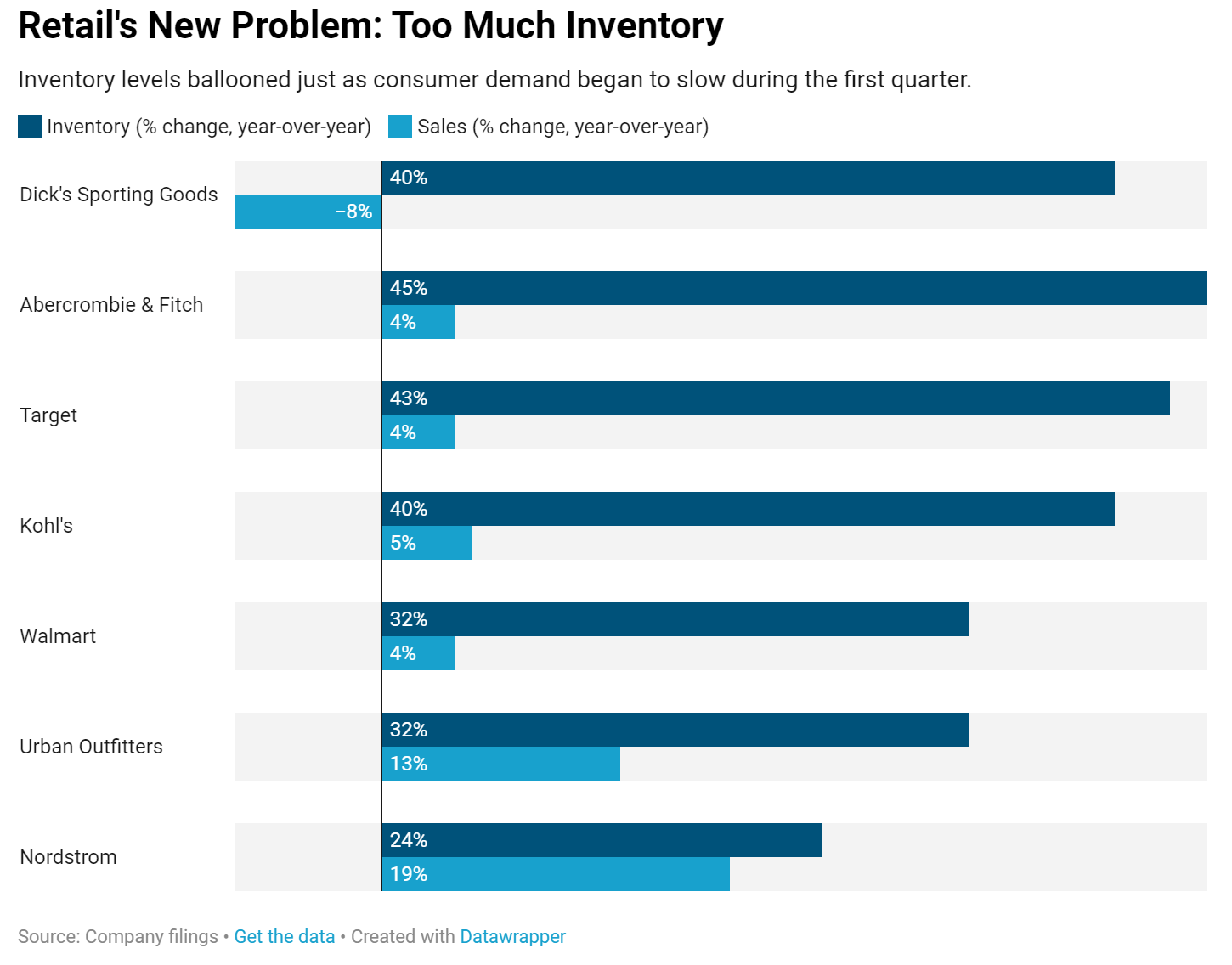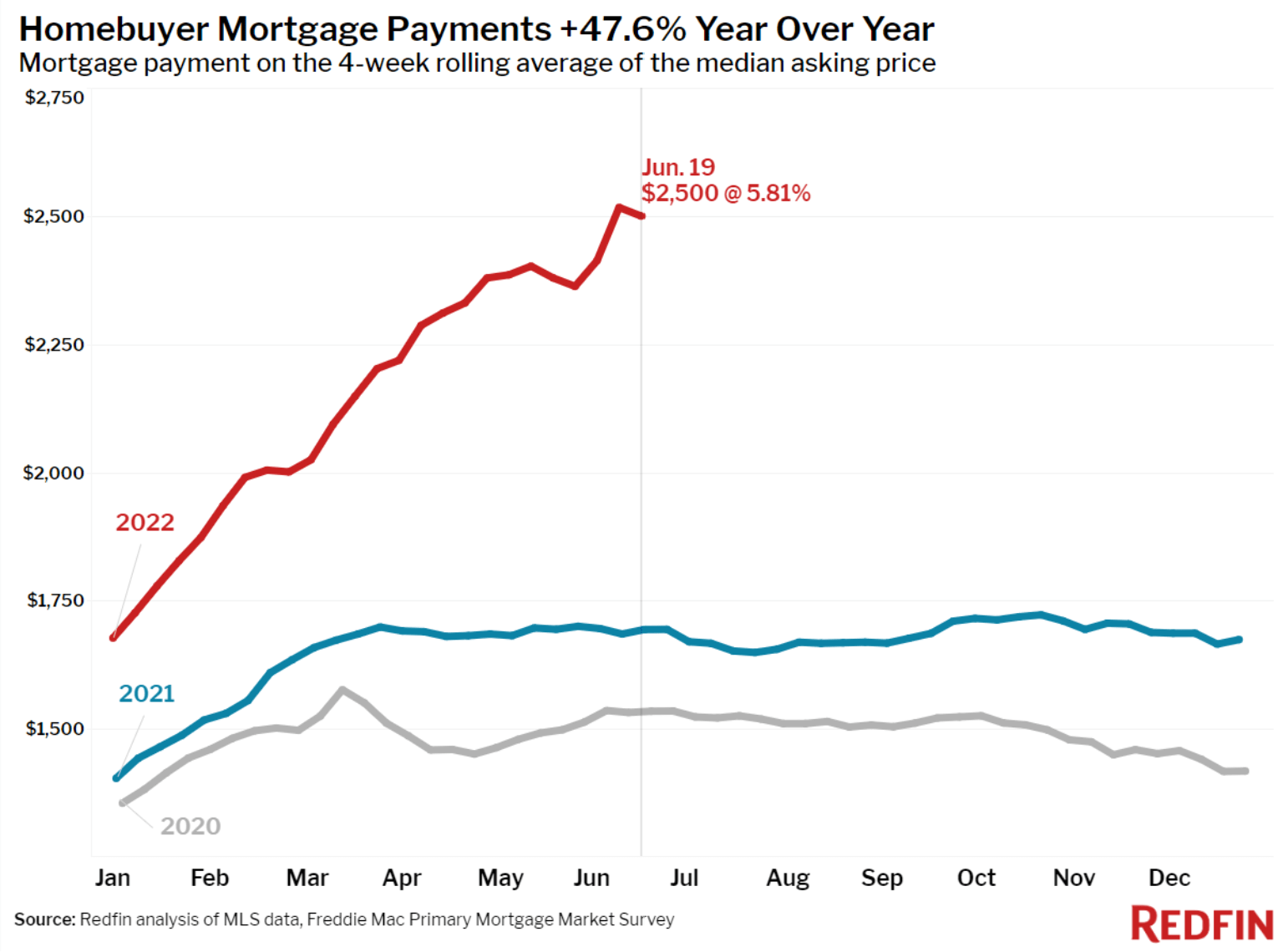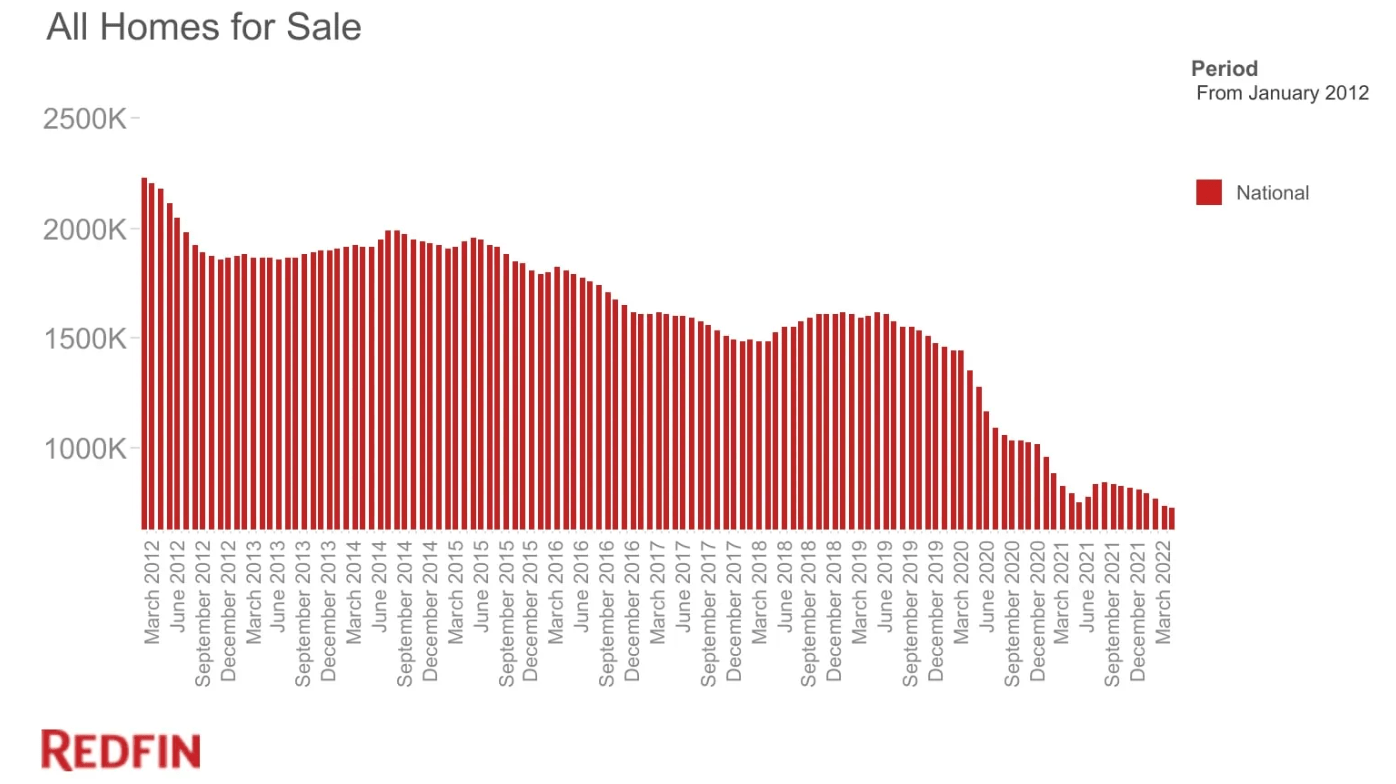TOGETHER WITH  | Happy Thursday to you. High gas prices are taking a toll on the US population's favorite summer tradition—the road trip. Can you guess what percent of Americans are planning to take a vacation by car within the next 6 months? a. 22.7%, b. 32.7%, c. 42.7%. Follow the wave 🌊 below for the answer. Here are the trending money topics for today: - The retail industry's problem
- A US housing market update
- Does inflation make us tip less?
| |
SECTOR FOCUS The Retail Industry's Problem |  | | Giphy—Target | | | The retail sector was one of the hardest hit both during and in the aftermath of the pandemic, but even after a buoyant recovery, there are some residual implications for shareholders to mull over. What happened? Global supply chains are nothing like fast cars. We can’t power them down drastically and then go 0-60 in 3 seconds when lockdowns end and demand bounces back. Getting things back up to speed takes time. Because of this, most retailers experienced shortages in multiple categories over the last couple years, and the response of many last year was to stock up as much as possible, maybe too much of it. Now, many big-name retailers with overstocked inventories collecting dust as a result of their binge.
Take stuff off our hands - Not just Target: Although Target has been atop the conversation due to their dropping margins and extra inventory (up 43% YTD), they’re not the only big name suffering. Kohl’s and Dick's Sporting Goods inventories are both up 40%, Walmart's is up 32%, Abercrombie & Fitch's up 45%, and Nordstrom is up 24%.
- Demand not present: Despite having more products to sell, most retailers haven’t seen a close correlation between increasing inventories and higher sales.
 Source: Forbes Source: Forbes
What it means for us - Market headwinds: Target made headlines by forecasting a major drop in profit margin during its latest earnings call, mostly due to higher expenses. As we can see, they’re not alone, and other heavily-weighted retailers are likely to suffer the same, which may be yet another excuse to ding the broader market in the process.
- Sales & discounts: Ideally, retailers would like to be perfectly stocked in a way that when one product comes in, one is sold. As the current inventory to sales figures show, there’s a lot of dead money taking up valuable space in retailers' storerooms, and they want to get rid of it. That means, discounts are now back in favor so use them wisely to stock up and save some money.
| | | |
REAL ESTATE A US Housing Market Update | | | | The housing market is, ironically enough, living in our heads rent free right now, and it'll remain an area to monitor closely over the foreseeable future. We’ve come to an apex of sorts where the real estate market will make a move one way or the other, depending on a couple factors. In a seemingly ever-changing situation, where are we now? Affordability - Prices are still high but momentum is slowing: It's no surprise that the average sale price of a US home jumped from $374,000 in Q2 of 2020 to $507,000 in Q1 of 2022. Single-family homes are now less affordable than they have been in nearly 75% of the US, according to Attom Data Solution. That's a 13-year record and up from 39% a year ago. Although home prices continued to run hot in April per data from S&P CoreLogic Case Shiller US National Home Price Index released just days ago, price growth momentum is slowing.
- And then there's the cost of a mortgage: Buying a home has the advantage of eventual ownership over renting, and with recent rent increases, it can even be cheaper. However, mortgage payments have gotten exceedingly expensive over the last 6 months, a 47.6% increase to $2,550 per month on average. That's close to half of the median monthly US household income.

Supply & demand - Supply shortages: It’s been widely known that we’ve got a significant housing shortage on our hands for some time now, and a buying frenzy these last couple years hasn’t helped much. Current supply sits at less than half what was available 10 years ago, and at the moment, new construction isn’t keeping up with demand.
- Residual demand: Yes, it was worth noting that demand is still very high, however, homes are also an illiquid market where activity tends to lag a lot more than equity markets, so it's reasonable to expect that demand will eventually taper, especially as affordability continues to be a problem.

An impending housing market crash? While the current pricing/affordability situation does look inherently unsustainable, when we consider all the market dynamics, it’s unreasonable to expect a dramatic decline right now. It makes sense that we’ll see demand drop off over time, but there’s no reason to expect it to evaporate in the face of rising rates, high prices, or the supply/demand dynamics. | | | |
SPONSORED BY CADRE Revolutionizing Real Estate Investing | | | | A key tenet for building a sound investment portfolio is diversification, and many professional investment managers suggest a portfolio allocation of 10% or more to commercial real estate investments. And achieving that diversification goal can actually be simple.* Enter Cadre. They’ve developed an innovative platform that gives investors direct access to highly curated commercial real estate investments alongside some of the largest financial institutions in the world. - Tap into their rigorous technology-driven, experience-led investment selection process that offers greater transparency and low fees.
- Get access to institutional-quality real estate with the potential for liquidity through their proprietary Secondary Market.
Learn more about how to start building your own commercial real estate portfolio today. 👉 | | | |
PERSPECTIVE Does Inflation Make Us Tip Less? | | | | The US is one of those weird countries where consumers pay a portion of an employer's salary expense in the form of tipping. And we've gotten pretty dang good at it, especially during the pandemic. According to data from payment processor Block (formerly Square), less than 50% of orders processed over the phone or online received a tip prior to the pandemic, and that number jumped to nearly 90% during the pandemic. Now though, we’ve regressed—back down to 84.4%. What does this all mean? - Americans tip more during hard times: Part of tipping comes down to how generous we’re feeling, and that’s because we know many service workers rely on those tips. During hard times and difficult working circumstances, it makes sense that we’d see a spike in tips.
- Tipping is on the debate table: Most people want to tip and help others out, especially if their service is good and interactions are pleasant. However, there’s a growing conversation about the ethics of it, and whether or not this should be the norm, or if services businesses should be held to the same wage requirements as others.
- But inflation makes tipping harder to stomach: Wages are up, but so are spending, debt and prices. Tipping is the part of a bill where we get to decide how much it costs. And with prices of goods and services rising month over month, it seems we're taking a step back to account for the fact that the things we’re buying are more expensive than they were a couple years ago, tips included.
| | | |
🔥 TODAY'S MOVERS & SHAKERS | - RH (-10.4%) as the home goods and furniture retailer issued weak guidance for its full year financials citing weaker home sales and a challenging economic environment.
- Spirit Airlines (+4.5%) delayed their shareholder's vote on its proposed merger with Frontier Airlines to July 8th. Meanwhile, JetBlue continues to push for their rival bid.
- Bitcoin (-4.6%) to $19,161.60 (1D)
- Ethereum (-6.1%) to $1,032.15 (1D)
This commentary is as of 8:45 am PDT. | | | |
🌊 BY THE WAY | - 🚐 Answer: a) 22.7%, a figure that's the lowest seasonally in over four years, excluding the summer of 2020 due to the pandemic. And ~36% of Americans intend to take a vacation within the next six months, the weakest June reading for any year in data going back over 40 years, excluding 2020 (Bloomberg)
- 🗑️ ICYMI. If cash is trash, what should you do? (Finny)
- ✅ 23 million Californians to get up to $1,050 in "inflation relief" checks (CBS)
- 🛍️ Amazon plans a second Prime shopping event in Q4 (CNBC)
- 👛 Finny lesson of the day. Ever wonder what it means to live frugally and whether its for you? If so, take this bite-sized lesson on the topic:
| | | |
What did you think of Finny's The Gist today? (Click to vote) | | | |
| Finny is a financial education platform on a mission to make your money work for you. We offer a customized financial learning platform through bite-size, jargon-free lessons, money trends & insights. The Gist is Finny's twice-a-week (Tues & Thurs) newsletter covering personal finance & investing insights and money trends. Finny does not offer investment and stock advice or endorsements. The Gist content team: Austin Payne, Chihee Kim. We're thankful for the support of today's brand partner—Cadre—as they make rewards on our platform possible. If you're interested in sponsoring The Gist, please reach out to us. And if you have any feedback for us, please contact us. | | | | | | | |
No comments:
Post a Comment